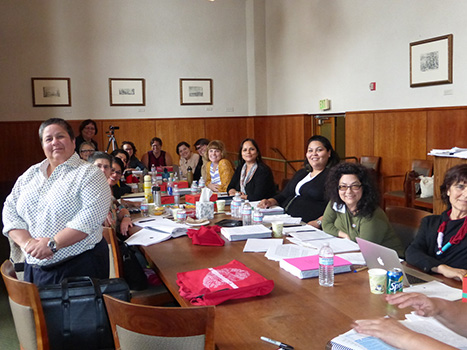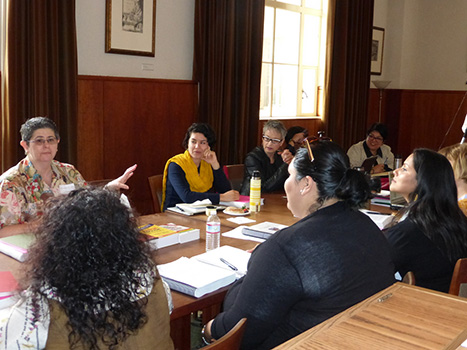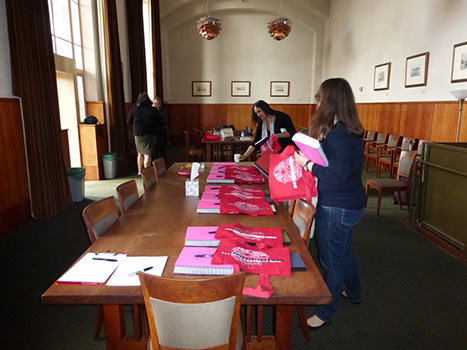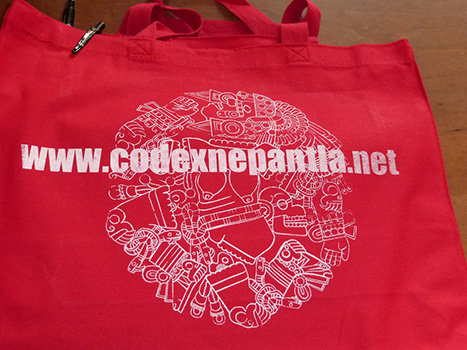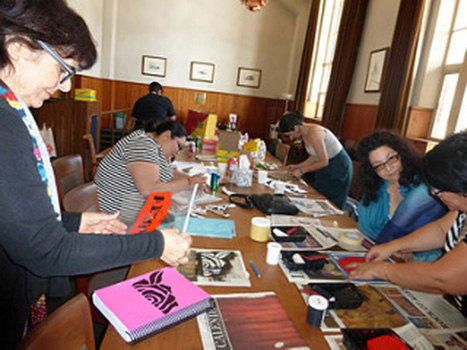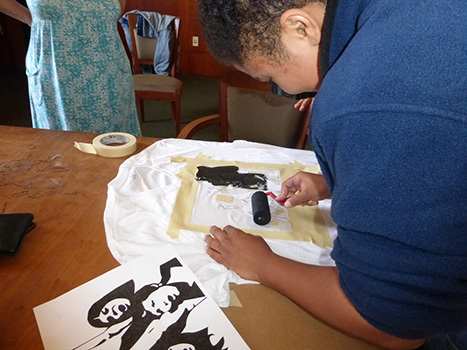"...Vivo en este estado liminal entre mundos, entre realidades, entre sistemas de conocimiento, entre sistemas de simbología.' Este terreno fronterizo al umbral de la conciencia, o pasaje, esta entretela, es lo que yo llamo 'nepantla.'"
"'...I live in this liminal state between worlds, between realities, between systems of knowledge, between symbology systems.' This liminal borderland terrain, or passageway, this interface, is what I call 'nepantla.'"
Since the 1970s, Chicana feminists have produced a robust library of monographs, books, anthologies, and journal articles, but hardly any of it has been translated into Spanish; hence, Spanish-speaking feminists, particularly at the grassroots level, have little access to Chicana epistemology. Anglo-American and French feminist publications are amply available in Spanish. Why not the work of Chicana feminists, who ostensibly share cultural and linguistic roots with Mexicans?
The Codex Nepantla Collective aims to translate Chicana feminist scholarship for a grassroots Spanish-speaking audience. We propose to create a web-based bilingual “codex” of Chicana feminist theories and concepts with the interpretive power of visual art. The word "nepantla" in Nahuatl means “space in between,” and this electronic codex will function as that theoretical in-between space that will facilitate access to Chicana feminist discourse for Spanish-speaking academics, students, and grassroots activists in Mexico.
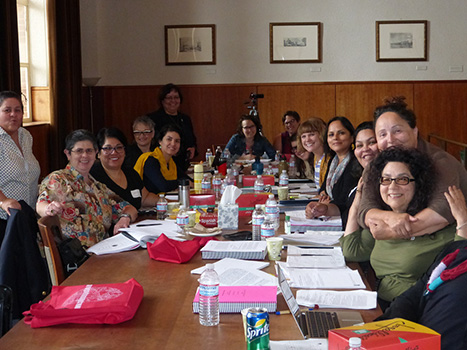
Pocha Poetics Workshop at UCLA, April 24 and 25, 2014
Project Description
According to Webster’s New World Dictionary, the word “translation” means to carry across from one place to another, to put into the words of another language, or to change into another medium or form. The translation work of the Codex Nepantla Collective will involve all three of these applications.
First, the Codex Nepantla Collective will be carrying the theories, concepts, and vocabularies of Chicana feminism across the linguistic border between English and Spanish as well as the ideological border between Mexican academics and activists. How do we translate terms such as Gloria Anzaldúa’s “mestiza consciousness” and the Coatlicue State,” Chela Sandoval’s “methodology of the oppressed,” and “the hermeneutics of love,” Emma Pérez’s “sitios y lenguas” and “the decolonial imaginary,” Alicia Arrizon's "queer mestizaje," Cherrie Moraga's "theory in the flesh," Jeanette Rodriguez's "disfrasismo," my own "tres Marias syndrome" and "alter-Nativity."
For a binational/transnational dialogue to occur between Chicana and Mexicana feminist academics and activists, it is crucial that Mexicana feminists understand how and why Chicana theorists adapt Spanish words and names drawn from Aztec mythology and give them new meanings that help us to theorize our daily lives: the difficulties of being Mexican in a xenophobic United States, of retaining our Spanish in an English-only society, of being constantly perceived as betraying our Mexican homeland and family either because of our "bad Spanish" or because of our feminism and/or lesbianism.
Second, the work of the Codex Nepantla Collective will render Chicana theory in another language, actually, in a double translation, not only from English to Spanish, but also from the often inaccessible language of theory to a more common language rooted in the personal voice.
Third, by using visual art to conceptualize Chicana feminist terminology, thereby expanding the praxis of the translation to include images, we can override some of the perceived linguistic deficit of many Chicana theorists for not being fluent in Spanish. Indeed, this lack of fluency in Spanish by the Chicana authors of many of these English-language texts makes the interpretive power of art critical to the project. How does art, and specifically popular and indigenous iconography such as the image of Coyolxauhqui--the Aztec warrior goddess slashed to pieces by her brother, the God of War--or, the figure of la Malinche--the supposed traitor to the Aztecs for her own acts of translation between the natives and the Spanish conquistadors--function as both a common and a foreign language between Chicanas and Mexicanas? How do we use these terms in our classrooms and in our scholarship? What is our translator’s agency in the face of what Gloria Anzaldúa called “linguistic terrorism,” the binational shaming and harassment that Chicanas/os receive from both sides of the border for the way we speak: our Mexican-accented Spanish that underscores our “foreignness” in the United States; or, conversely, our English-accented and pocho (polluted/degenerate/embarrassing) Spanish that marks our supposed betrayal of our Mexican homeland?
Both of these linguistic scenarios signify what Rosemary Arrojo calls the “intimate connection between language and power” and illustrates “the ways in which we construct and relate to the foreign and how this relationship transforms and redefines the domestic” More than the literal carrying across of meaning from one language to another, then, translation accentuates “the essentially political character of the translator’s craft” (250-251).
Through this work, then, which involves the study and interpretation of linguistic and cultural codes, as well as the practice and performance of new communication skills, Codex Nepantla participants will develop a bilingual/bicultural/ bimodal methodology for explaining and translating key terms in Chicana feminist theory, a process that I call “trans-interpretation,” which will generate new knowledge on the ethics, aesthetics, and politics of translation as a postcolonial praxis, and a tool for social change.
Codex Nepantla Workshop: Norma Alarcon on Wednesday, August 17, 2016
Traductoras: Professors Elena Avilés, Alicia Gaspar de Alba, Maria Cristina Pons and Sandra Ruiz
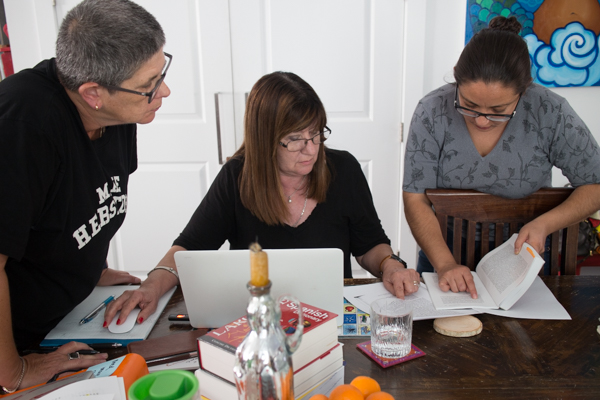
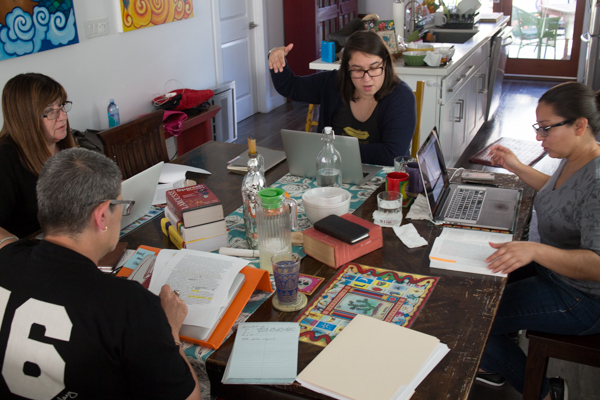
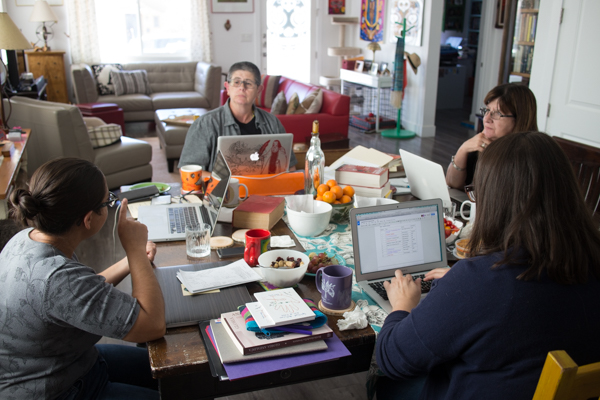
Codex Nepantla: Chela Sandoval
Professor Gaspar de Alba and her PhD students, Kendy Rivera and Rachael Greenberg trans-interpret Chela Sandoval's "Author's Note on Transalation as Trans-interpretation" from the Acknowledgements to La Metodologia de la Emancipacion (4 August 2015)
